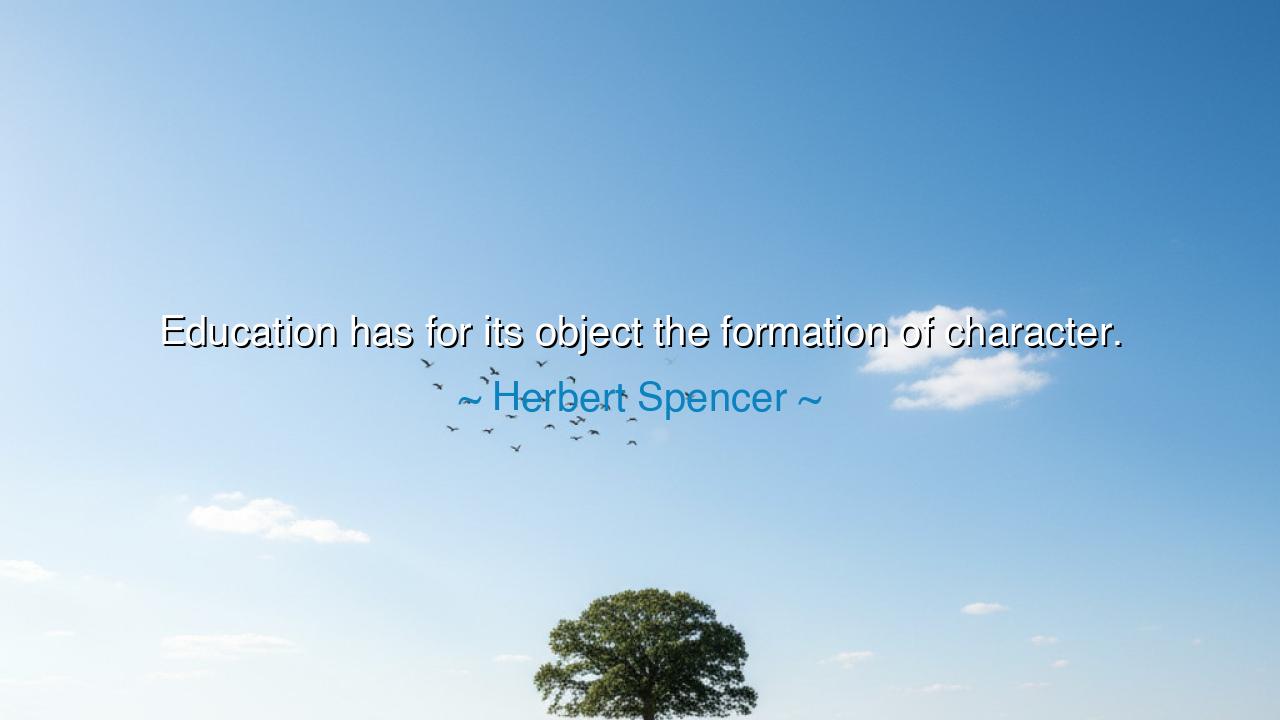
Education has for its object the formation of character.






Hear the words of Herbert Spencer, philosopher of the nineteenth century, who gazed upon the nature of society and the individual, and declared: “Education has for its object the formation of character.” These words, simple yet profound, strike at the heart of what it means to teach and to learn. For Spencer reminds us that education is not merely the adornment of the mind with facts, nor the sharpening of the intellect for gain, but the shaping of the very soul of a person—the forging of character that endures when knowledge fades.
For what is character? It is the sum of one’s virtues and habits, the inner law that governs action when no eyes are watching. Knowledge alone can be turned to good or evil, but character determines how knowledge is wielded. A clever thief and a wise ruler may both possess learning, but their characters divide them like day and night. Education, therefore, fails its highest duty if it produces brilliant minds but corrupted hearts.
Spencer’s thought was born in an age of industry and progress, when machines roared and science advanced swiftly. Yet he saw the danger: a society rich in invention but poor in virtue would collapse upon itself. He knew that the true object of education must be not only to feed the intellect, but to form men and women of integrity, discipline, and courage. Thus, he spoke his warning—that without the formation of character, learning itself becomes hollow.
History testifies to this truth. Consider the example of George Washington. His schooling was modest compared to some of his contemporaries, yet his character—his honesty, humility, and steadiness—made him the father of a nation. When offered the crown of kingship, he turned it aside, choosing instead to set the precedent of peaceful transfer of power. His greatness lay not in knowledge alone, but in character refined by duty and honor. His life was living proof of Spencer’s words.
On the other hand, history shows the destruction wrought when education is severed from character. The scholars of Nazi Germany were among the most educated men of their age, skilled in science, law, and philosophy. Yet without virtue, their knowledge was twisted into tools of horror. They had education, but not character; knowledge, but no conscience. Here lies the darkest proof that education without moral formation is not salvation but ruin.
The wisdom of Spencer’s words, then, is both warning and call. True education must cultivate truthfulness, courage, compassion, and self-control, as much as it cultivates literacy and science. Teachers are not only transmitters of facts but shapers of souls. Parents are not only providers of shelter but builders of character. Every book read, every lesson taught, must aim at the higher goal: not merely the trained mind, but the noble heart.
Therefore, O listener, let this be your guide: do not measure your education by the number of facts you know, but by the strength of your character. Ask yourself: does my learning make me more honest, more just, more courageous, more kind? Strive to unite wisdom with virtue, for the two are meant to walk together. Without virtue, wisdom is dangerous; without wisdom, virtue is blind. But together, they form the crown of true education.
And so remember Spencer’s teaching: the great object of education is not simply knowledge, but the formation of character. Seek learning, but let it transform you into one who stands firm in truth, who acts with justice, and who leaves behind not only words, but a life that speaks to generations yet to come. For character is the monument of the soul, and education its sculptor.






AAdministratorAdministrator
Welcome, honored guests. Please leave a comment, we will respond soon